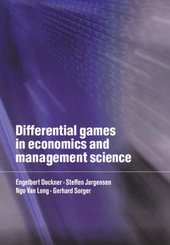
|
Differential Games in Economics and Management Science
Paperback / softback
Main Details
| Title |
Differential Games in Economics and Management Science
|
| Authors and Contributors |
By (author) Engelbert J. Dockner
|
|
By (author) Steffen Jorgensen
|
|
By (author) Ngo Van Long
|
|
By (author) Gerhard Sorger
|
| Physical Properties |
| Format:Paperback / softback | | Pages:396 | | Dimensions(mm): Height 245,Width 167 |
|
| Category/Genre | Economic theory and philosophy |
|---|
| ISBN/Barcode |
9780521637329
|
| Classifications | Dewey:330.015193 |
|---|
| Audience | | Professional & Vocational | | Tertiary Education (US: College) | |
|---|
| Illustrations |
9 Tables, unspecified
|
|
Publishing Details |
| Publisher |
Cambridge University Press
|
| Imprint |
Cambridge University Press
|
| Publication Date |
16 November 2000 |
| Publication Country |
United Kingdom
|
Description
A comprehensive, self-contained survey of the theory and applications of differential games, one of the most commonly used tools for modelling and analysing economics and management problems which are characterised by both multiperiod and strategic decision making. Although no prior knowledge of game theory is required, a basic knowledge of linear algebra, ordinary differential equations, mathematical programming and probability theory is necessary. Part One presents the theory of differential games, starting with the basic concepts of game theory and going on to cover control theoretic models, Markovian equilibria with simultaneous play, differential games with hierarchical play, trigger strategy equilibria, differential games with special structures, and stochastic differential games. Part Two offers applications to capital accumulation games, industrial organization and oligopoly games, marketing, resources and environmental economics.
Reviews'This book brings together the various strands of knowledge on non-cooperative differential games for the first time. A great merit of the text is that it is, technique-wise, self-contained. The large number of worked examples enhances considerably the clarity of the material ... The book fills a large gap and will facilitate inclusion of differential games as part of mainstream game theory courses at advanced undergraduate and graduate levels. Teaching purposes aside, game theorists as well as PhD students will benefit a lot from this excellent new text. The book will enable researchers to add differential games to their arsenal of techniques in looking for the best modelling approach to address economic questions.' Arupratan Daripa, Times Higher Education Supplement
|